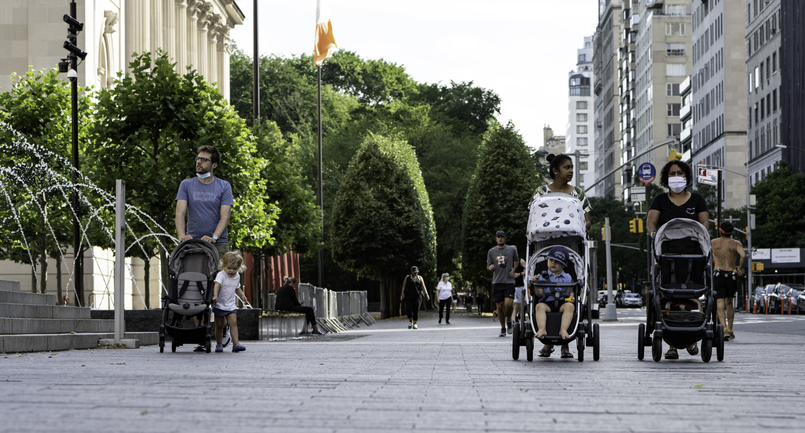The domestic worker movement has arrived at an unprecedented moment. The pandemic has simultaneously presented one of the greatest crises domestic workers have had to face and one of the greatest opportunities for our movement to fight for the future we all need.
Almost overnight in March 2020, every domestic worker in the U.S. faced job loss as families began isolating to protect themselves against the pandemic spreading across the nation. In surveys conducted in March and April, 72 percent of domestic workers reported having no work and 94 percent reported that their client, rather than them, had cancelled due to concerns about the coronavirus.
At the same time, our society has begun to focus in a new way on the work that takes place in the home. As families shelter in place, domestic work has become the center of our daily lives. Working parents struggle to manage childcare and schooling while working from home, caring for loved ones who are elderly or disabled, and cleaning and sanitizing the home.
As the infrastructure of professional domestic work has been torn away, the essential nature of domestic work has become acutely clear. Suddenly, a workforce that has long operated in the shadows and existed in the margins of the economy has become national news. Domestic workers are now recognized as essential workers.
There are close to 2.5 million domestic workers in the United States. They are the nannies who care for our children, the caregivers who care for our elderly and disabled loved ones, and the housecleaners who care for our homes. At the National Domestic Workers Alliance, we call domestic work “the work that makes all other work possible.” And yet, this work has historically been undervalued and underpaid, and domestic workers today continue to fight exploitation.
Domestic workers today are disproportionately women of color, and the devaluation of domestic labor is yet another form of race and gender discrimination. Black women have long been exploited for domestic labor; many of the earliest domestic workers were enslaved Black women. The lack of federal labor protections for domestic workers is a direct result of this racist history: domestic workers were excluded from New Deal protections as a concession to Southern legislators who did not want to grant labor rights to a predominantly Black workforce. As a result, domestic workers today make, on average, nearly eight dollars less per hour than other working people — a “domestic worker gap” that is even larger for women of color.
In 2015, NDWA founded We Dream in Black to build the collective power and visibility of Black caregivers, nannies, and professional cleaners. NDWA sought to invest in Black worker organizing infrastructure, particularly in the South, where right to work laws and an anti-labor political context have created obstacles for workers to organize and build power.
Black women have long led the domestic worker movement, from the daily acts of resistance among enslaved women, to the coordinated strikes of 19th century washerwomen, to the organizing initiatives of 20th century domestic workers like Dorothy Bolden and the National Domestic Workers’ Union.
We Dream in Black returns to those roots. The initiative takes a “whole person” approach to organizing. We believe that labor organizers must fight to eradicate systemic poverty and disrupt systemic violence and over-policing of Black people. We won’t do that just by changing the workplace; we have to change the entire society. So many of the social and economic opportunities available to us — where we live, what kind of education we have access to, where we get care — are determined by the work we do and the wages we earn. As the Director of Black Organizing at We Dream in Black, my work is dedicated to creating pathways for Black domestic workers to build power not only in the workplace but also in their communities and in the broader political arena.
In 2019, We Dream in Black surveyed our members to learn the issues that matter most to Black women workers. The survey data shaped our Unbossed Women’s Agenda, a political agenda for Black domestic workers for 2020 and beyond. The agenda calls to 1) transform the care sector to make care jobs good jobs, 2) invest in care infrastructure that supports thriving communities and 3) reimagine institutions and policies that harm Black domestic workers so that they can work and live with safety and dignity.
Our Unbossed Agenda is bold, but the moment calls for us to be bolder than ever before. Black domestic workers are experiencing multiple crises at once. The coronavirus health and economic crises are layered upon racial oppression, devaluation of feminized labor, and the unregulated nature of domestic work.
Domestic workers are not alone; our working conditions represent the reality of work in America. Even pre-pandemic, work was changing. More and more people are working outside of the structures that our current workplace laws and social safety net were designed around. The pandemic has only exacerbated the precarity of workers — most of them Black women and other women of color — already facing poor working standards defined by low pay, lack of benefits, and lack of regulation.
As the structure of work continues to shift, the path to building worker power and transforming work isn’t clear. It is critical that we invest in innovative organizing programs to build worker organization, dignity, and respect — both inside and outside the workplace. If we can win power for Black domestic workers, we can win power for all workers. We’re in a moment defined by crises we never wanted, but, perhaps, this is the opportunity to fight for — and win — a future that respects and values our work.

